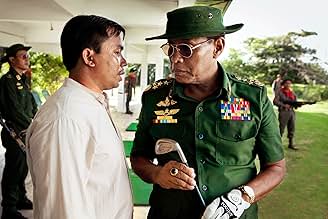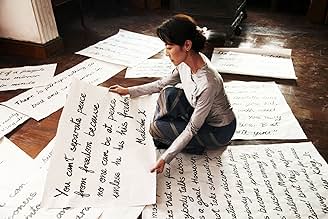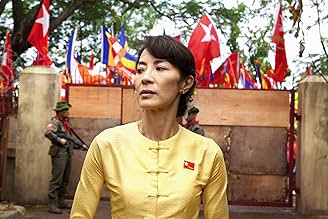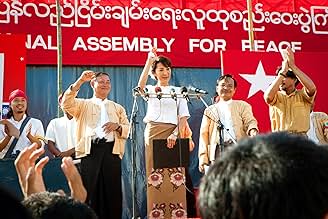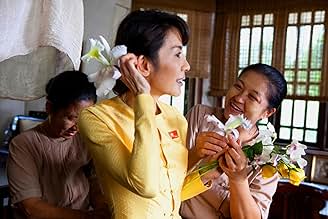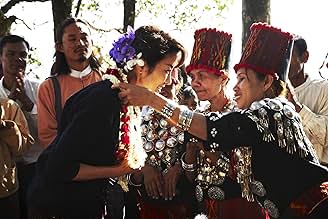A história de Aung San Suu Kyi, quando ela se torna o núcleo do movimento democrático da Birmânia e o relacionamento com o marido, o escritor Michael Aris.A história de Aung San Suu Kyi, quando ela se torna o núcleo do movimento democrático da Birmânia e o relacionamento com o marido, o escritor Michael Aris.A história de Aung San Suu Kyi, quando ela se torna o núcleo do movimento democrático da Birmânia e o relacionamento com o marido, o escritor Michael Aris.
- Prêmios
- 3 vitórias e 2 indicações no total
Avaliações em destaque
The movie is a truly beautiful love story, one that touches on the human spirit as few movies do. It is inspirational, nothing less. You will be moved by the story. The movie depicts the life of a people under military dictatorship and how the whole nation rallies behind the person that was destined to lead it despite all odds. You are likely to be following Aung San Suu Kyi ongoing real life story from that point on, as she is still very much the people's leader today. I could not recommend this movie more strongly.
I would recommend this film to anyone as essential viewing, whether or not you have an interest in political affairs or not. The politics in The Lady is so simply set out and self- explanatory that anyone would understand the issues at hand.
There are some similarities with another masterpiece of Besson "Leon: The Professional": both are in admiration of "courage and love". Aung San Suu Kyi like Leon is an alone hero fighting against tyranny and organized corrupted power. If the effort of Leon to protect the young innocent Mathilda made you feel sympathy for this individual, undoubtedly you will admire this brave woman her comfort herself and her family to defend the whole nation from the dictatorship of the military regime.
My wife and I really enjoyed the movie. The Parisian cinema was almost full and at the end gave the impression that the spectators were satisfied .One row ahead of us there was a senior couple, the old man asked: "darling did you like it for the second time?" The lady answered: "sure, could we come again to watch it for a third time?!"
P.S: It's a shame that she as the Myanmar leader has not provided the relevant response to the Rohingya humanitarian crisis. It is depressing to see how an earlier hero of peace, could become silence and indifferent in the treatment of its Rohingya minority, who according to the UN have suffered ethnic cleansing and violent attacks by Myanmar's military forces. The reel life is sadly more cruel than the movie!
And yet this did not happen; the Burmese regime succeeded in maintaining its iron grip on power. Perhaps the reason was that, unlike many other tyrannies, it lacked any recognisable ideology beyond an Orwellian vision of "a boot stamping on a human face, forever". Communism collapsed when it became clear that it could not perform its ostensible ideological function, the protection of the economic interests of the working man. This in turn provoked the collapse of right-wing dictatorships like Pinochet's in Chile or Suharto's in Indonesia, which had justified their existence by claiming to defend their countries against Communism. Apartheid collapsed when it became clear that the economic interests of black and white South Africans were so closely intertwined as to make nonsense of the idea of "separate development". Than Shwe's junta, lacking any ideology which could be discredited in this way, could resist the forces of change for as long as it could maintain the loyalty of its troops and its own will to power.
"The Lady" depicts the life of Suu Kyi, known as "the lady" to her followers. It is not a complete biography, as it shows little of her early life, apart from the assassination of her father Aung San when she was three years old. The main action begins in 1988, when she was in her mid-forties and returned to Burma to visit her ailing mother, having previously been living in England with her husband Michael Aris, an Oxford professor. Her visit coincided with an uprising against military rule, which was followed by a brief period of liberalisation. She was persuaded to lead the country's nascent pro-democracy movement, and her party, the National League for Democracy, won a convincing majority in the 1990 parliamentary election. The military, however, refused to recognise the result and reimposed martial law. Suu Kyi was placed under house arrest and all political campaigning was forbidden. The junta seemed quite unmoved by international condemnation; even the award of the Nobel Peace Prize to Suu Kyi in 1993 could not persuade them to release her.
The film was directed by Luc Besson, who was perhaps not the ideal director, as he had previously best been known for making action movies such as "Nikita". He had made a previous biography of a national political heroine, "Joan of Arc", but even there the action scenes are the best thing about the film. It is perhaps therefore unsurprising that "The Lady" is rather slow and ponderous and shows signs of having been made by a director unused to this style of film-making. Visually, however, the film is often attractive, with effective contrasts between the green, tropical lushness of South-East Asia- these scenes were shot in Thailand rather than Burma itself- and the grey stone of Oxford, a city often seen in the snow.
To be fair to Besson, he appears to have been deeply committed to this film, and it is possible that without his commitment it might never have been made. He was fortunate in having a leading lady, Michelle Yeoh, who was just as committed as he was; indeed, it was she who persuaded him to take on the project. Yeoh here gets to show, as she did in "Memoirs of a Geisha", that she is more than just a Bond Girl, more than just a kung-fu action heroine. She has the advantage of bearing a striking resemblance to the woman she is portraying.
Yeoh described the film as "an incredible love story", and the element most emphasised in the film is the relationship between Suu Kyi and her husband, from whom she was separated for many years. She would have been free at any time to leave Burma and rejoin him and their two sons in England, but always refused to do so, knowing that if she ever left the country she would never be permitted to return. David Thewlis as Aris is perhaps even better than Yeoh, playing him as an unworldly academic and devoted family man who nevertheless selflessly insists that his wife remain in Burma, knowing that if she leaves the country this will be a great blow to the pro-democracy movement. His premature death from cancer, possibly brought on or exacerbated by the stress of his situation, is the film's most tragic moment.
Suu Kyi's house arrest has now been lifted and Burma is now ruled by a civilian government, although it remains to be seen whether it will evolve into a genuine democracy; the elections in 2010 were widely denounced as neither free nor fair, and the new government as a mere front for a continuing military dictatorship. The expulsion of Michelle Yeoh from the country last year would suggest that the authorities are still very touchy about criticism. The film, however, performs the valuable service of reminding the world of the problems of a country which was for too long one of the last bastions of tyranny. I certainly preferred it to "The Iron Lady", the other recent biopic of a major female political figure. 7/10
It was amazing to see Michelle Yeoh as Ang Sang Suu Kyi, the act was elegantly presented, the way how Michelle put her hand on the waist while walking gracefully, reminded me so much of the Lady, everything comes natural, nothing pretentious, it's a joy to see such a great act with simple body language, it even sent me a sort of spine-tingling joy when she walked on the stage to give her first public speech at Shwe Dagon People Forum.
I think Michelle did not disappoint the Lady and the people of Myanmar.
The storyline may be oversimplified but I would still rate this movie with 9, it's hard to present the whole struggle of Daw Ang Sang in a short time, but I guess most people who go and watch this movie should already have some background of what happened in real life.
I've seen the Lady in Hong Kong and found it one of the best movies of its kind.
Você sabia?
- CuriosidadesFollowing Suu Kyi's controversial reign as State Counsellor of Myanmar and her defense of the Rohingya genocide, both filmmaker Luc Besson and screenwriter Rebecca Frayn stated they regretted making this film.
- Erros de gravaçãoThe production of the assault rifle AK-47 began in 1949. The Burma soldiers cannot have this rifle in 1947.
- Citações
Aung San Suu Kyi at 2 years old: Daddy, tell me a story.
Aung San - the Father: Hmm, well, I could tell you about the days when Burma was the Golden Land. Is that the kind of story you want?
Aung San Suu Kyi at 2 years old: Yes!
Aung San - the Father: Once upon a time, Burma was a beautiful country blessed with great forests of teak and ebony. This was a time when tigers still prowled the jungles, and elephants roamed the great plains. You'd find sapphires as blue as the bluest sky. And rubies redder than your cheeks. More jewels than a princess like you could ever wish for.
Aung San Suu Kyi at 2 years old: And then?
Aung San - the Father: Actually, it's a sad story. Soldiers from a faraway land came and stole all our precious things. That's how our country became so poor.
- ConexõesFeatured in Maltin on Movies: This Means War (2012)
- Trilhas sonorasSlug
Words and music by Brian Eno, Bono, Adam Clayton,
The Edge& Larry Mullen Jr.
Performed by Passengers
Principais escolhas
- How long is The Lady?Fornecido pela Alexa
Detalhes
- Data de lançamento
- Países de origem
- Central de atendimento oficial
- Idiomas
- Também conhecido como
- The Lady
- Locações de filme
- Myanmar(on location)
- Empresas de produção
- Consulte mais créditos da empresa na IMDbPro
Bilheteria
- Faturamento bruto nos EUA e Canadá
- US$ 355.391
- Faturamento bruto mundial
- US$ 7.832.142
- Tempo de duração2 horas 12 minutos
- Cor
- Mixagem de som
- Proporção
- 2.35 : 1
Contribua para esta página




